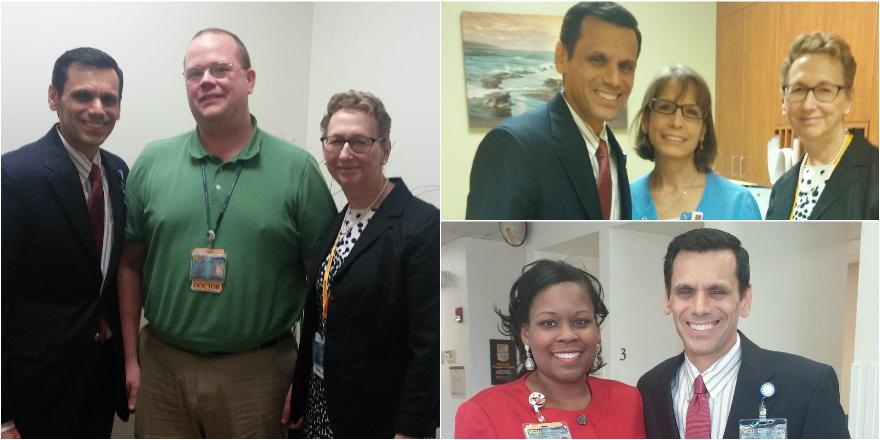Our office is located in South Richmond, Virginia. The neighborhood that surrounds us was, when the practice opened, mostly made up of low-income African-American residents. Starting in 2000, Richmond's Latino community started to grow, and this growth has been largely centered in South Richmond. Richmond's largest single housing community is just about 1/2-1 mile from our office: about 1,000 townhomes, now estimated at 80-85% Latino. This change in the demographics of Richmond has been sudden (from about 5,000 Hispanic residents in the city to over 20,000 in 15 years), and I believe that this is going to be a permanent shift for the city.
The Latino community is a young community, composed of young and growing families. In our office, 25-30% of our patient visits are for pediatric patients (under 18), and 70% of our these patients are Spanish-speaking. Meanwhile, the low-income African-American community has not left--many of our adults are uninsured (between 50-60% of our adult visits 18-64 are uninsured--recall that Virginia has opted not to expand Medicaid). The office also has a high mental health comorbidity among our patients: in one survey, 44% of our patients had moderate/severe ratings of anxiety and/or depression, and only one-half were receiving active care. We also have a high proportion of patients who are dealing with chronic pain and/or substance abuse.
Many of these patients have little access to needed healthcare services. We are able to provide much of their healthcare, but we lack the capacity and contacts to allow for full-service behavioral health care (e.g. including counseling, not just medications). Our adult uninsured patients lack access to dental care. Our Spanish-speaking children and families face a landscape in Richmond nearly devoid of Spanish-speaking behavioral health providers: an increasing problem given the fact that increasing numbers of Latino kids are now entering school...and running into learning problems and facing behavioral issues.
I shared with our President how exciting it is, then, for us to be working to fill these gaps in care. We have physicians who are in the office, and working with this sometimes challenging patient population, by choice. We have been awarded two grants--one from the Richmond Memorial Health Foundation and another from the Virginia Health Care Foundation--to provide in-office behavioral health services in collaboration with our Department of Psychology. Even better: the RMHF grant specifically targets services to the Latino families. The VHCF will provide us with one-day-a-week coverage from a psychiatric nurse practitioner to better help adults with chronic or severe mental illness. Now that the office renovations are completed, we can also look to resume our tele-psychiatry collaboration with our system's Child and Adolescent Psychiatry service.
I am very glad that we were able to discuss and share these initiatives with our President and with our healthcare leadership. Admittedly, these may be small steps in the greater healthcare landscape in Richmond, but they are important steps, and it is important to have supportive leadership helping push this forward.


3 comments:
Mark:
As always your work and that of your team is impressive. The demographic shift does signal new needs for the community, so your institution's movement to meet it is commendable. Glad you have a President who is curious about the real field work going on. Kudos.
Carmen
Thanks for your efforts in filling the gaps. It appears there are still more actions that must be resolved: access to behavioral health resources by adults and to Spanish speaking providers. I am curious if the tele-behavioral health programs with the mother ship hospital will fill some of that gap with adults. Are there interpreter volunteers in the community or what is the city offering with ESL programs? And, for children, the City of Honolulu and the Tripler Army Medical Center placed a behavioral health specialist (may be able to add to the grant) in the schools that allowed the students to come see the specialist during school hours. Parents signed a document that stated they didn't need to be there. This arrangement filled a gap between getting to the appointments without disrupting school class times, parents ability to get off work, and to meet the needs of our dependents whose parent (s) had deployed numerous times. Good luck.
Thanks for your efforts in filling the gaps. It appears there are still more actions that must be resolved: access to behavioral health resources by adults and to Spanish speaking providers. I am curious if the tele-behavioral health programs with the mother ship hospital will fill some of that gap with adults. Are there interpreter volunteers in the community or what is the city offering with ESL programs? And, for children, the City of Honolulu and the Tripler Army Medical Center placed a behavioral health specialist (may be able to add to the grant) in the schools that allowed the students to come see the specialist during school hours. Parents signed a document that stated they didn't need to be there. This arrangement filled a gap between getting to the appointments without disrupting school class times, parents ability to get off work, and to meet the needs of our dependents whose parent (s) had deployed numerous times. Good luck.
Post a Comment